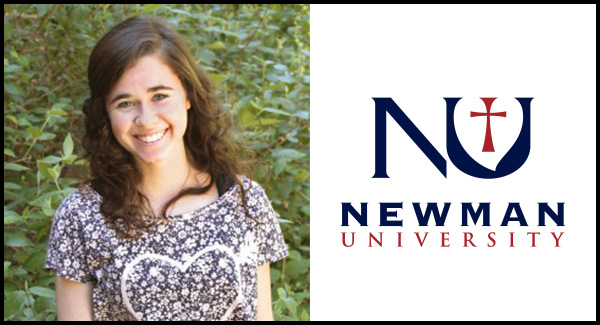Newman University alumna Emily Simon ’16, who recently graduated with a double major in English and history, was an honors student, wrote for the student newspaper The Vantage, and won the Joyce Suellentrop Prize for Distinguished Scholarship in History two years in row.
Now, Simon can add another achievement to her list: An educational roleplaying game that she created with the help of Associate Professor of History Kelly McFall, Ph.D. will be used in classes at colleges in Arkansas and Maryland.
According to McFall, developing the game was not all fun and … well, games.
“The amount of effort and knowledge that goes into making a game is really quite extraordinary,” he said. “It’s incredibly rewarding to see Emily engaged in this process and it reflects enormously well on her.”
McFall has written multiple games himself, uses roleplaying games regularly in his classes, and serves on the editorial board for the Reacting Consortium, a group of colleges and universities that work to develop and publish roleplaying games like Simon’s.
McFall said Simon came to him with the idea for her game in the summer of 2015 when they were preparing McFall’s freshman honors seminar class. Simon served as an honors student assistant/class facilitator and played the games with the freshman honors students.
Simon, who had played many games already, said she had always wanted to try writing a game and her idea fit in well with their plans for the class.
“It would be nice, Dr. McFall and I thought, to have two big games and then a mini game to not tire them out as much,” she said. “I made the mini game for that class. That was the first time it was played.”
Simon’s game, “The North Korean Hunger Games,” is set at a fictional 1998 United Nations conference and has players working together (or against each other) in an effort to decide how to provide aide to North Korea after a devastating famine has left the country in dire straits, she said. While this specific U.N. conference is technically fictional, Simon said, the famine of 1994 to 1998 was a very real catastrophe that ended with the deaths of over 300,000 North Koreans.
“I just needed a way to pull a lot of countries and NGOs [non-governmental organizations] together in one place,” she said. “The general idea is how do you help a country whose government you don’t agree with.”
After playing Simon’s game in the freshman honors seminar class, McFall and Simon also played it at this year’s Reacting to the Past Game Development Conference at Central Michigan University.
McFall said the goal of the conference was to play and improve games like Simon’s. Professors and students from colleges and universities from across the country came together to workshop various games and improve them for publication.
Simon said it was very helpful but also very nerve-wracking to have her game played at the conference.
One of the professors who played Simon’s game at the conference was very complimentary.
“Playing the North Korea game, allowed me to experience the complexities of humanitarian aid in the modern era,” said Rebecca Livingstone, assistant professor and chair of the Department of History at Simpson College,
Indianola, Iowa. “It is not simply a matter of wanting to do ‘good’ by providing food to starving people, but rather the morality or providing aid becomes subordinated to geopolitical and national agendas.”
She added, “That such a thought-provoking game was designed by an undergraduate student is a testament to the strength of the History Department at Newman.”
Since their return from the conference, McFall and Simon have received word that the game was picked up by Hendrix College in Conway, Ark., and a world civilization class at Frostburg State University in Frostburg, Md.
Simon, who is moving to South Korea this month to teach English for a year, said if they play her game in the freshman honors seminar this year she might Skype in and play if there isn’t too much of a time difference.


